“Hobbies and interests don’t belong on a resume.”
That’s a common myth—and one that could cost you an edge in a competitive job market.

Do you put hobbies and interests on your CV? I haven't put this on for years and I'm wondering if it's ever been a barrier in getting a job interview. I know it's mainly bots that reads CVs these days, but still, is it a barrier, when the CV is read by a human? -- from Reddit
When included strategically, hobbies and interests can bring your resume to life. They offer a glimpse into your personality, help you connect with recruiters on a human level, and can even strengthen your overall candidacy—especially if they reflect transferable skills or align with the company culture.
Still, not every resume needs a hobbies section, and not every hobby adds value. Knowing when to include interests on a resume—and choosing the right ones—makes all the difference.
In this guide, you’ll learn how to list hobbies on a resume the right way: when they help, which ones employers actually care about, and how to present them so they enhance—not clutter—your application.
Here’s a quick breakdown of what you’ll find:
- Should You Mention Hobbies and Interests on Your Resume?
- 15+ Best Hobbies and Interests to Put On Your Resume
- How to List Hobbies and Interests on a Resume
- 5 Tips for Choosing the Right Interests for Your Resume
Read on to make your resume more well-rounded and memorable—with the right personal touch.
Should You Mention Hobbies & Interests on Your Resume
It depends—but the short answer is: sometimes they add value, and sometimes they don’t.
If you’re a mid- to senior-level professional with a strong career track, chances are your resume is already packed with relevant experience, skills, and achievements. In that case, including a hobbies and interests section probably isn’t necessary—and if it pushes your resume to a second page unnecessarily, it's best left out.
But if you’re just starting out—say, you're a recent graduate, changing careers, or applying for internships—then listing interests on your resume can work in your favor. Not only does it help fill in space when your work history is still growing, but it also gives hiring managers a glimpse into who you are outside of your academic or training background.
Bottom line: whether you include hobbies on a resume depends on your experience level, resume space, and how relevant your interests are to the role you’re targeting.
In the next section, we’ll cover exactly when it makes sense to list hobbies—and how they can boost your chances when used strategically.
Difference Between Hobbies and Interests
Before you decide whether to include hobbies or interests on your resume, it’s important to understand what sets them apart.
Although the terms are often used interchangeably, hobbies and interests aren’t exactly the same:
- Interests refer to subjects or topics you’re curious about or enjoy learning more about. Think history, sustainability, or classical music—these aren’t things you necessarily practice every day, but they fascinate you and reflect your mindset or values.
- Hobbies are the hands-on activities you actually do in your free time. Playing the piano, painting, hiking, or cooking—these show how you spend your time outside of work or school and often highlight transferable skills.
So why does this matter on a resume?
Including hobbies can show hiring managers practical strengths, like creativity, collaboration, or discipline. For example, listing team sports as a hobby hints at strong communication and teamwork skills. On the other hand, listing interests like travel or global cultures can make you a more appealing candidate for roles that require adaptability or international work.
Both can add value—if they’re relevant. Choosing the right interests for your resume can create a more well-rounded impression and support the soft skills you want to showcase.
Now that you know the difference, let’s break down exactly when it’s smart to include hobbies and interests on your resume.
When to Include Hobbies and Interests on Your Resume
You don’t need to force hobbies and interests into every resume—but in the right context, they can be surprisingly effective.
If your resume still has extra space after including essential sections like your contact information, work experience, education, and skills, it might be worth adding a short section for hobbies. This is especially true if you're early in your career, making a career change, or applying for entry-level roles with limited relevant experience to showcase.
Some companies also care deeply about team culture and look for candidates who bring personality to the table. If the job description hints at a creative, collaborative, or people-focused environment, including a few thoughtful interests can help you stand out. It becomes even more relevant when the company directly asks for hobbies or personal interests as part of the application.
It’s also worth considering how your interests relate to the role. For example, listing Dungeons & Dragons might not seem relevant at first—but if you’re applying for a writing, game development, or creative strategy role, that hobby could highlight storytelling skills, collaboration, and imagination—all qualities that employers value.
So while hobbies on a resume aren’t always necessary, when aligned with the role and your career stage, they can add a meaningful layer to your professional story.
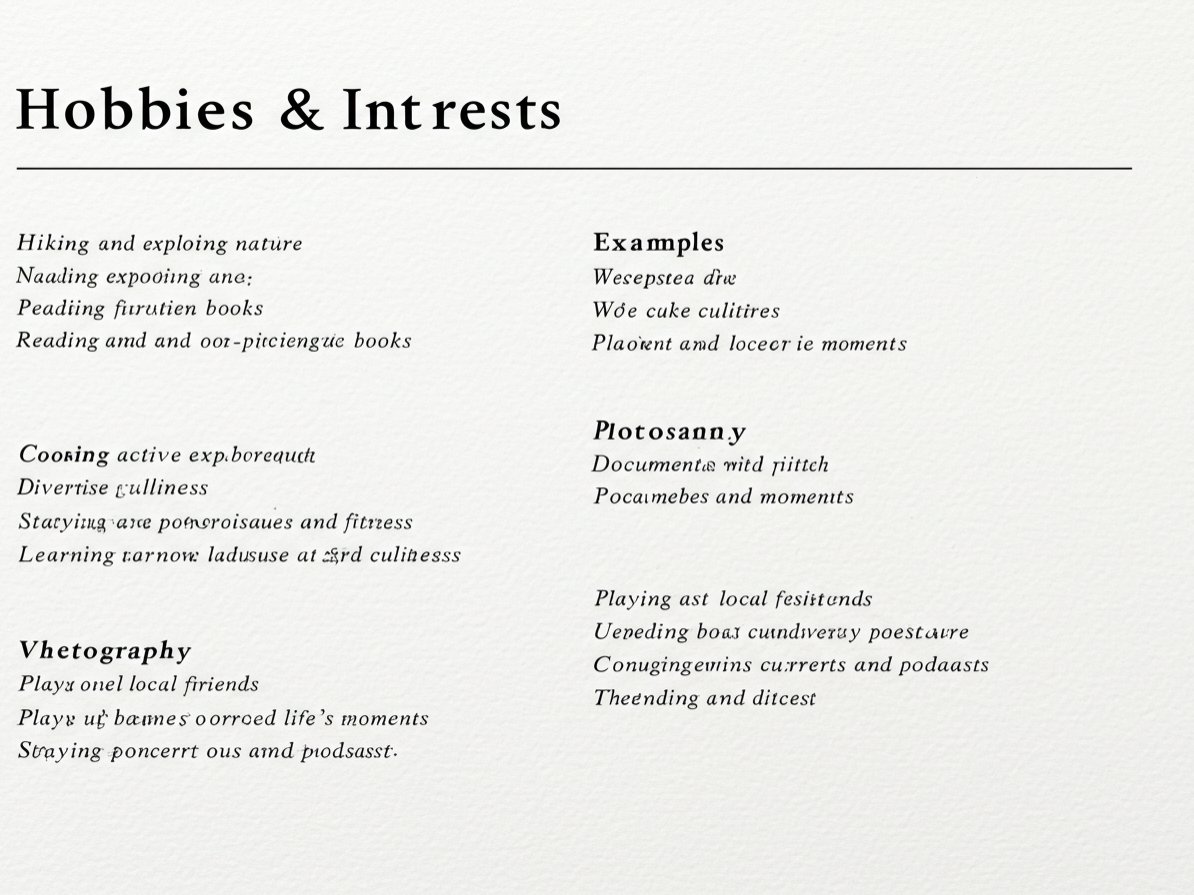
Why Use JobHun for Your Resume
Finding the right way to highlight your hobbies and interests is just one part of creating a standout resume. At JobHun, we make the entire resume-building process easier—from formatting to fine-tuning.
With our free AI resume builder, you can quickly generate a professional resume that highlights your strengths, including your skills, work experience, and even relevant hobbies that match your target job. Not sure how your resume looks? Use our AI resume checker to get instant, personalized feedback on what to improve.
Whether you’re a student, career changer, or seasoned professional, JobHun helps you create resumes that get noticed.
👉 Try our free resume builder and ATS-friendly resume checker and make your next application your best one yet.
Go to the JobHun Website
Start by visiting JobHun.com.
Once you're on the homepage, click the 👤 profile icon in the upper-right corner. This will take you to JobHun’s resume builder web app.
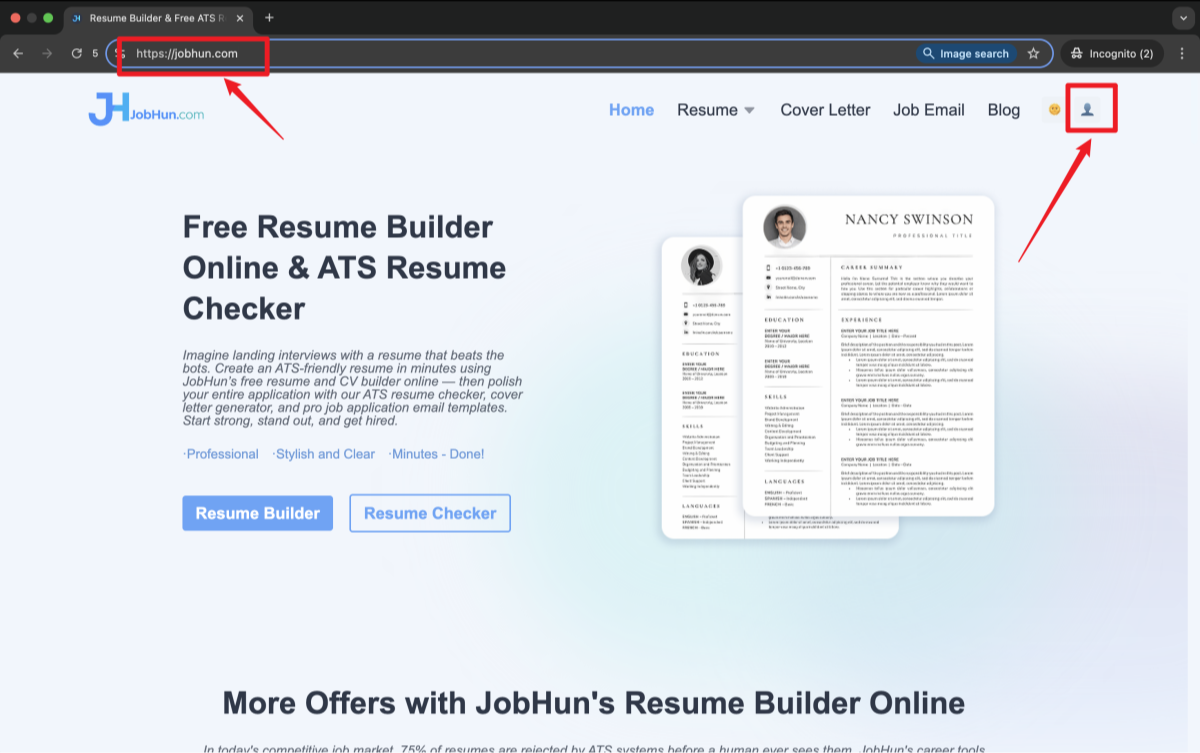
Access the Resume Dashboard
You’ll land on webapp.jobhun.com/mine.
If you’re not logged in yet, the site will prompt you to sign up or log in.
- Click the “New Resume” button, or
- Click “Go to Login” in the upper-right corner.
Either option will take you to the sign-in page.
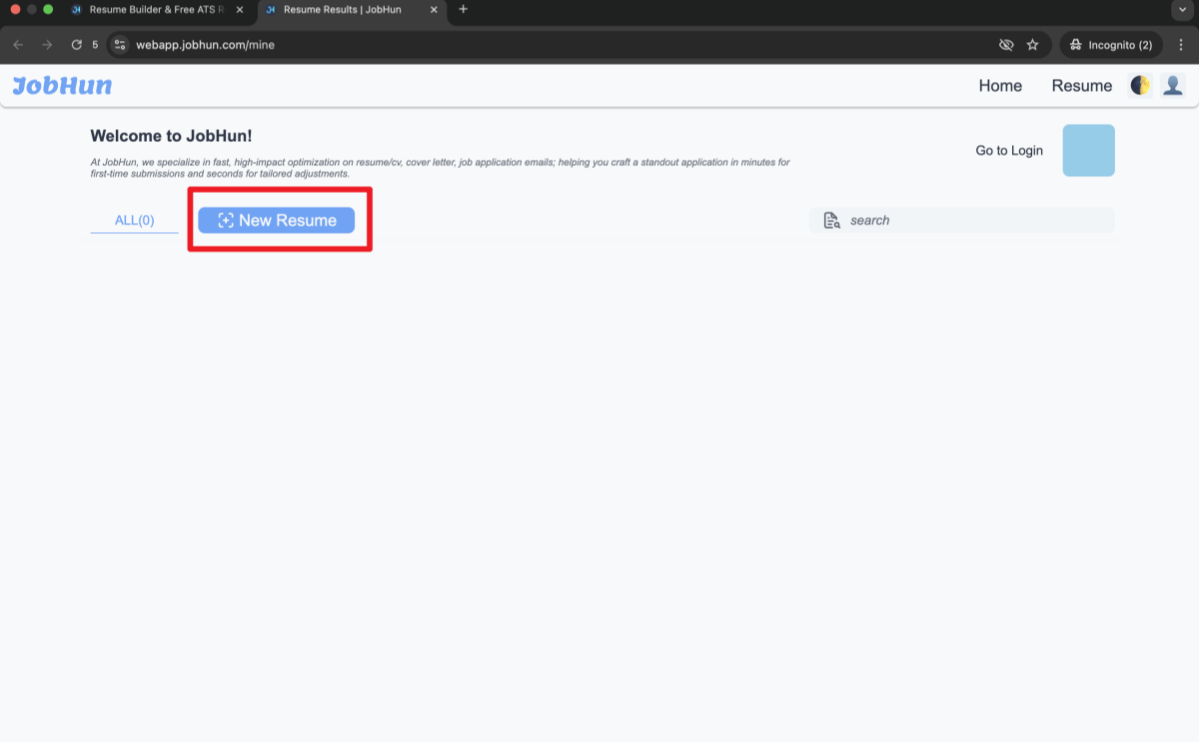
Sign Up or Log In to Your Account
You have two login options:
- Use your Google account for quick access
- Or manually enter your email, password, and name, then click “Go”
Once you're signed in, your personal dashboard will appear.
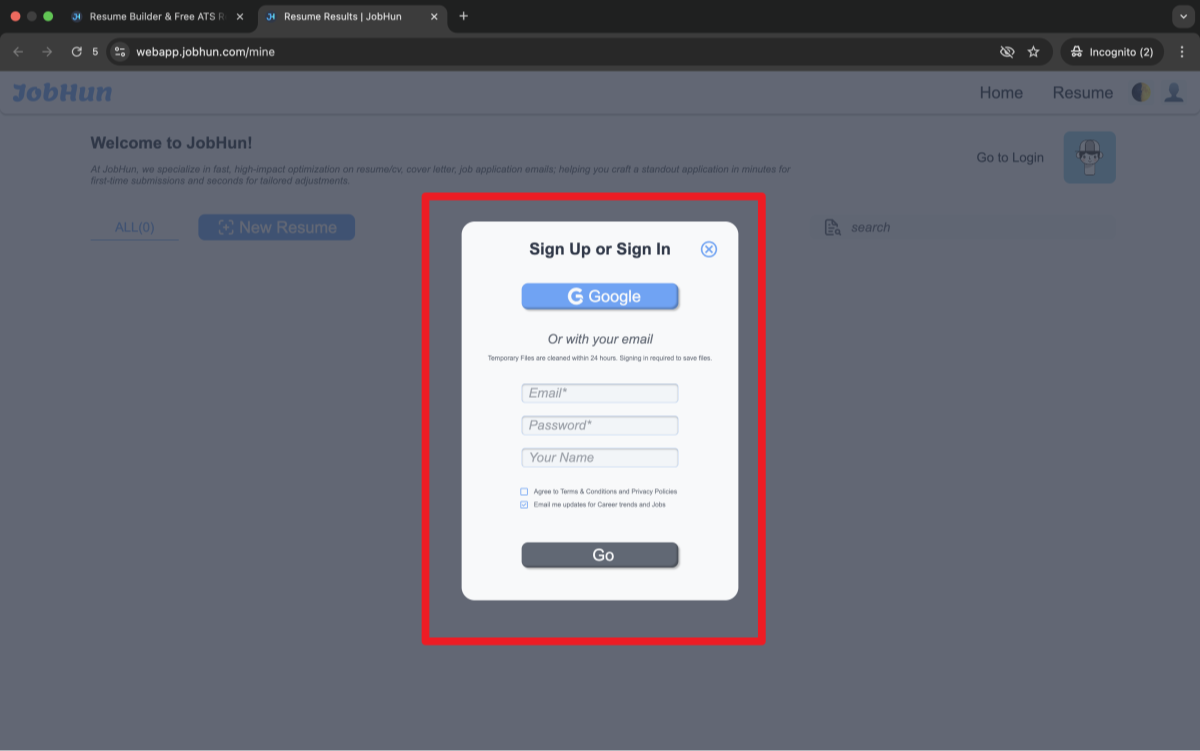
Click “New Resume” to Get Started
Now that you’re logged in, your profile details (name, email, join date) will show in the top-right corner.
Click the “New Resume” button again to open the AI resume builder.
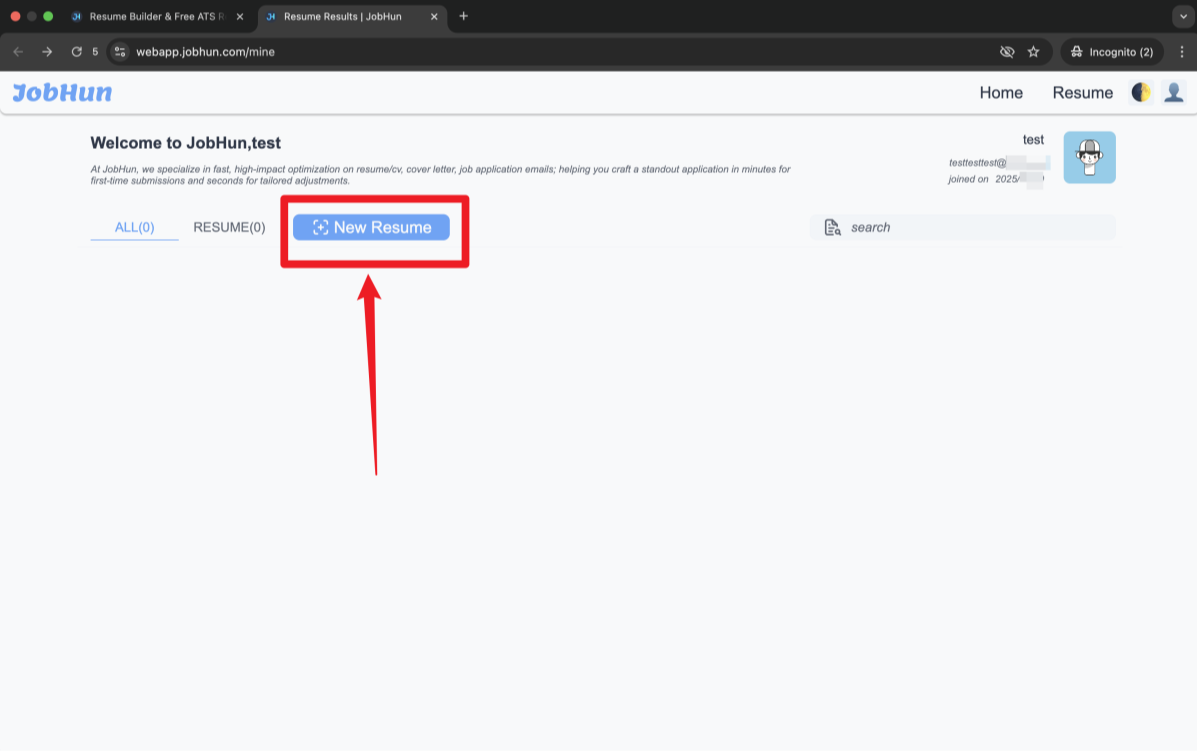
Build and Customize Your Resume
The resume builder layout is split into two main parts:
- Left panel: Your control dashboard, where you can add, edit, or organize resume sections (summary, experience, skills, etc.)
- Right panel: A live preview of your resume that updates as you make changes
You can now:
- Use AI to auto-generate resume content
- Manually edit each section
- Format, reorder, and polish until you're happy with the result
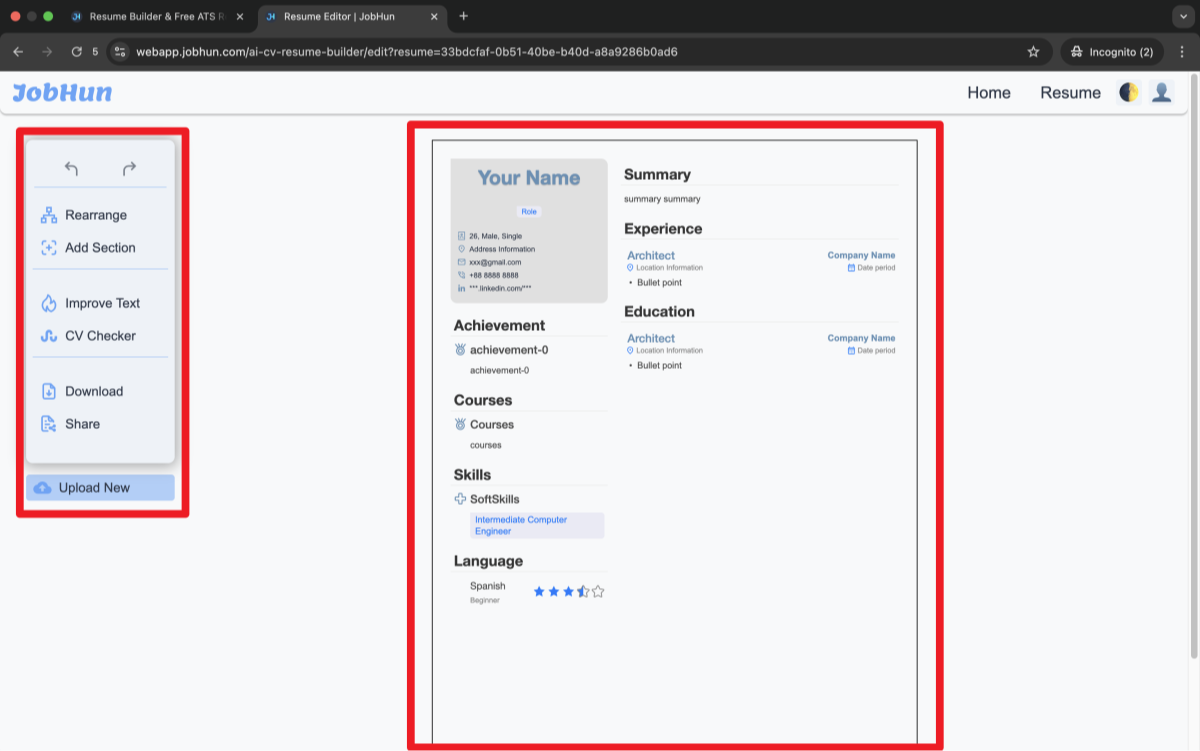
15+ Top Hobbies and Interests to Put on Your Resume
The key to making hobbies and interests work on your resume is relevance. They should complement your professional profile—not just fill space.
Too often, candidates list vague or overly casual activities like watching movies or listening to music. While there's nothing wrong with these in real life, they don’t say much to a hiring manager skimming your application.
To help you choose meaningful, strategic interests for your resume, here are some of the best examples—based on the qualities employers look for most:
Community Involvement
Volunteering is one of the strongest hobbies you can list. Studies show that candidates who volunteer have significantly higher chances of getting hired. Why? Because community involvement demonstrates empathy, leadership, and initiative. It also suggests you can work well with others and contribute to causes beyond yourself—all traits that employers love to see.
Writing
Strong communication is a top soft skill across industries. If writing is something you enjoy outside of work—whether it’s creative writing, journaling, or contributing to online publications—it shows you're able to express ideas clearly and thoughtfully, both on and off the job.
Blogging
Blogging is another standout interest for resumes. It not only shows strong written communication skills, but also positions you as a self-starter who takes initiative. Running or contributing to a blog often requires planning, consistency, and independent thinking—all valuable assets in any role.
Learning Languages
If you’re learning or fluent in more than one language, that’s absolutely worth including. Language skills are a major plus in roles involving international communication, multicultural teams, or travel. Plus, learning a language shows cognitive flexibility, problem-solving ability, and a willingness to engage with different perspectives—qualities that translate across professions.
Photography
More than just a creative outlet, photography involves attention to detail, patience, and technical know-how. It can also reflect your ability to see the world from different angles—something that’s highly useful in marketing, design, communications, and even customer service roles.
Travel
At first glance, travel might not seem like a particularly job-relevant hobby. But someone who’s passionate about exploring new places often brings much more to the table than just vacation photos.
Frequent travelers tend to be curious, open to new perspectives, and comfortable navigating unfamiliar environments. These are traits that translate into strong adaptability, cultural awareness, and an eagerness to learn—qualities that can help you thrive in dynamic work settings and global teams.
Sports
Whether it’s team-based or individual, engaging in sports is a great way to signal key soft skills on your resume. Sports promote discipline, collaboration, and leadership—skills that employers value across nearly every industry. They also speak to your ability to stay committed, perform under pressure, and work toward shared goals. And yes, physical activity is also linked to better brain function and emotional balance, which only strengthens your case as a high-performing candidate.
Reading
Reading may seem like a quiet pastime, but it’s one that often hints at deep intellectual curiosity, focus, and a desire for self-improvement. From fiction to non-fiction, regular readers tend to have a stronger vocabulary, sharper critical thinking skills, and better written communication—all assets in roles that involve analysis, communication, or strategy. If reading is something you genuinely enjoy, it’s a solid interest to mention, especially for research-heavy or content-driven positions.
Making Music
Creating music requires much more than talent. It calls for concentration, patience, and a willingness to practice consistently over time. People who play instruments or compose music often demonstrate a strong blend of creativity and discipline—two attributes that many employers look for. Music is also linked to improved memory and focus, making it an interest worth including on your resume if it feels true to you.
Yoga
Practicing yoga isn’t just about flexibility—it’s about building mindfulness, focus, and emotional balance. If yoga is part of your lifestyle, it can reflect a grounded and self-aware mindset, which is helpful in high-stress or fast-paced work environments. It suggests that you know how to manage pressure and maintain your mental clarity—something every hiring manager can appreciate.
Art Pursuing
art as a hobby signals creative thinking and problem-solving skills—two highly transferable abilities in today’s job market. Whether it’s painting, illustration, or digital design, artistic hobbies show that you can think outside the box and bring fresh ideas to the table. Creativity is also increasingly associated with innovation and strategic thinking, making it a strong asset to highlight on a modern resume.
Dance
Dance is more than just physical movement—it’s an expression of rhythm, focus, and coordination. If you enjoy dancing, whether socially or competitively, it can indicate a blend of cognitive sharpness, stress relief, and teamwork (especially in partner or group settings). It’s a well-rounded hobby that speaks to both physical and mental agility.
Public Speaking
If you enjoy public speaking—whether through debate clubs, Toastmasters, or simply giving presentations—it’s a powerful interest to include on your resume. Public speaking reflects confidence, clarity in communication, and the ability to engage an audience—skills that are valuable in leadership, sales, education, and client-facing roles. It also signals that you’re comfortable stepping up, which can help you stand out in interviews and collaborative work settings.
Coding and Personal Tech Projects
Tinkering with websites, building apps, or automating simple tasks in your free time isn’t just impressive—it shows initiative, logical thinking, and a passion for learning. If you're applying for a job in tech, data, or product development, this interest can be especially relevant. Even if it’s not a technical role, coding as a hobby tells employers that you're digitally fluent and comfortable navigating complex problem-solving.
Cooking or Baking
While cooking might seem like a personal hobby, it can reflect traits that carry over well into the workplace. Precision, time management, attention to detail, and following complex instructions are all part of the process. If you’re applying for a role where process, creativity, or multitasking is important, mentioning cooking or baking can subtly reinforce your fit—even more so in food, hospitality, or event-based industries.
DIY or Crafting Projects
Hands-on hobbies like DIY home improvements, woodworking, knitting, or upcycling show more than just creativity. They demonstrate patience, project ownership, and problem-solving—all qualities employers appreciate. This interest also suggests that you're resourceful and enjoy bringing ideas to life, which aligns well with roles in design, operations, marketing, and product development.
How to List Hobbies and Interests on a Resume
Including hobbies and interests on your resume can work in your favor—but only when done with intention. Hiring managers don't just want to see a long list of random activities. If you want your hobbies section to strengthen your application, it needs to be thoughtful, concise, and relevant to the job.
Here’s how to get it right:
Think About Whether You Actually Need Them
Before adding anything, ask yourself: will listing hobbies on your resume add to your application, or simply take up valuable space?
If you’re a mid-career or senior professional with a resume packed with achievements, work history, and technical skills, there’s usually no need to include hobbies. Your accomplishments already speak for themselves, and adding an interests section might distract from what truly matters.
But if you’re a recent graduate, changing careers, or applying for a position at a company that values personality and cultural fit, the right hobbies and interests can help round out your resume. They give hiring teams a glimpse of who you are outside of work—and sometimes, that’s the detail that makes you memorable.
Just make sure your resume still fits neatly onto one page. If hobbies push you over the limit, it's a sign they might not be essential.
Learn More About the Company
Once you've decided to include hobbies, your next move should be researching the company you’re applying to.
Understanding the employer’s culture can help you choose the right hobbies and interests to list on your resume. Look for clues about the company’s values and work environment—do they emphasize creativity? Collaboration? Well-being?
You’ll find helpful insights in places like:
- The job description — especially in the soft skills or "about you" sections
- The company’s careers or "About Us" page
- Their LinkedIn and social media posts
- Employee bios or culture blogs
Matching your resume hobbies to the company’s tone and values can make you seem like a stronger fit—before you’ve even stepped into the interview.
Be Strategic With What You Include
Now comes the selective part.
Instead of listing every pastime you’ve ever enjoyed, focus on hobbies that connect to soft skills the company is likely to value—like teamwork, leadership, creativity, or resilience.
If the job post emphasizes collaborative work, hobbies like team sports or volunteering make more sense than solo activities like puzzles or model building. Likewise, for roles in marketing or design, creative hobbies such as photography, writing, or art help reinforce your brand.
You can also use hobbies to fill in the blanks when your professional experience is still growing. For example, if you're applying for a junior UX design role but lack formal experience, listing design-related hobbies—like creating mockup apps or running a visual inspiration blog—can show initiative and relevant passion.
Every hobby should have a purpose. If it doesn’t align with the role or highlight transferable skills, it’s best left out.
Create a Separate Section and Keep It Brief
Once you’ve selected the most relevant hobbies, place them in a separate section near the bottom of your resume. Label it clearly as “Hobbies & Interests” or “Personal Interests.” This keeps your resume layout clean and gives the section its own space without competing with your work experience or education.
The hobbies section should act as a final personal touch—not the centerpiece. Think of it as a quiet nudge to help the recruiter connect with you on a human level.
Keep the List Short and Focused
For your resume hobbies section, less is more. Aim to include no more than four to six hobbies or interests. Any fewer and it looks sparse; any more and it can start to feel like filler.
Stick to one-liners, no need to explain each hobby unless it’s not immediately clear why it’s relevant. You want the section to feel curated, not cluttered.
5 Key Tips for Listing Hobbies and Interests on a Resume
If you’ve decided to include a hobbies and interests section on your resume, make sure it’s working for you—not against you. Done right, this section can add personality and even reinforce your qualifications.
Done poorly, it risks making you look unfocused or unprofessional.
Here are four practical tips to help you highlight your hobbies in the best way possible:
Understand Why You Enjoy Each Hobby
It’s not just what you do in your free time—it’s why you do it that can set you apart. Getting clear on the reasons behind your hobbies makes it easier to describe them meaningfully on your resume and speak about them with confidence in an interview.
Take photography, for example. Do you love it because it helps you stay present and explore your surroundings? Or because it’s a creative outlet that sharpens your attention to detail?
This level of insight can transform a generic bullet point into a conversation starter.
Keep It Honest and Authentic
Just like the rest of your resume, honesty is key when listing hobbies. It might be tempting to include a trendy or impressive-sounding interest, but if you can’t genuinely speak about it, it can backfire during the interview.
For instance, if you write “hiking” on your resume but your version of a hike is walking the dog around the block, you might struggle when the hiring manager—who happens to be an avid hiker—asks for your favorite trails.
Instead, keep it real:
Honest Example: Physical activity: enjoy daily 45-minute walks outdoors to reset and stay energized.
Overstated Example: Hiking
Recruiters value authenticity. Sharing what you actually enjoy gives them a more accurate—and relatable—picture of who you are.
Be Clear and Specific
The more detail you can give (without turning your resume into a novel), the more memorable your hobbies section becomes. Instead of vague mentions like “languages” or “sports,” get a little more specific about what that looks like for you.

Example
Language learning: currently studying Mandarin and French with the goal of becoming conversational in both.
This small shift shows initiative, consistency, and curiosity—all traits hiring managers value, especially when your hobbies align with the job’s soft skill requirements.
Avoid Controversial or Vague Hobbies
Not all interests belong on a resume. Some can come off as too eccentric, too personal, or just unclear. If a hobby could be misinterpreted or potentially raise eyebrows, it’s better to leave it off.
Here are a few types of hobbies to avoid:
- Highly personal or polarizing topics (e.g. political activism, religious activities)
- Activities that suggest risk, danger, or violence (e.g. fire juggling, extreme survivalism)
- Jokes or tongue-in-cheek entries that may not land well (e.g. “partying like there’s no tomorrow”)
- Overly solitary hobbies that hint at low social interaction unless the job specifically values that
- Generic or vague descriptions (e.g. “watching movies” or “listening to music”) that don’t reveal anything unique about you
When in doubt, stick to hobbies that reflect curiosity, growth, creativity, or collaboration—especially ones that relate to your target role or showcase transferable soft skills.
Align Your Hobbies With the Job’s Soft Skills
One of the smartest ways to use the hobbies section on your resume is to subtly reinforce the soft skills the job posting emphasizes. While your professional experience shows what you've done, hobbies can suggest how you work and who you are beyond the office.
For example:
- Applying for a leadership role? List hobbies that show responsibility and initiative, like organizing local events or coaching a youth team.
- Targeting a creative position? Mention hobbies like painting, music production, or creative writing.
- Looking to join a fast-paced team environment? Team sports, volunteering, or group-based hobbies highlight collaboration and adaptability.
When your resume hobbies are thoughtfully aligned with the qualities the employer is seeking, they don’t just fill space—they build trust. It’s a subtle but effective way to strengthen your fit for the role.
50 Best Hobbies and Interests to Put on a Resume (With Examples)
Need a spark of inspiration?
Choosing the right hobbies for your resume isn’t just about filling space—it’s about revealing your personality, soft skills, and values in a way that supports your job goals. Below, we’ve categorized 50 of the best resume-worthy hobbies and interests, so you can find what fits you and the job.
Sports & Physical Activities
Physical hobbies are excellent for showcasing traits like teamwork, endurance, discipline, and leadership. Depending on the job, highlighting individual or team-based sports can help position you as driven, collaborative, and goal-oriented.
Examples:
- Basketball
- Football (Soccer or American)
- Volleyball
- Tennis
- Swimming
- Baseball
- Cycling
- Marathon Running
- Skiing
- Mountain Climbing
- Martial Arts (e.g. Karate, Judo)

PRO TIP
Team sports highlight collaboration and communication skills, while endurance or solo sports show determination, goal-setting, and resilience.
Analytical & Creative Thinking
These hobbies reveal your ability to think critically, solve problems, and engage in complex thought processes—perfect for roles that require strategy, planning, or innovation.
Examples:
- Chess
- Writing (Fiction or Non-Fiction)
- Playing a Musical Instrument
- Drawing & Illustration
- Blogging
- Reading Non-fiction or Thought Leadership
- Graphic Design
- Video Editing
- Puzzle Solving (e.g. Sudoku, Logic Games)
- Painting

PRO TIP
These hobbies reflect calmness, strategic thinking, imagination, and introspection—ideal for analytical or creative roles like marketing, design, or IT.
Social & Interpersonal Interests
Social hobbies highlight your ability to work well with others—perfect for customer-facing or collaborative roles. They show that you value communication, community, and empathy.
Examples:
- Organizing a Book Club
- Public Speaking
- Attending Networking Events
- Language Learning Groups
- Cultural Exchange Meetups
- Volunteering
- Dancing (Solo or Group)
- Camping with Groups
- Group Cooking or Potlucks
- Hosting Events (Online or Offline)

PRO TIP
Social hobbies reinforce emotional intelligence, openness, leadership potential, and an ability to engage diverse groups.
Unique & Memorable Hobbies
These stand-out interests can be conversation starters and help your resume be remembered—just ensure they align with the company's culture and aren’t too niche or controversial.
Examples:
- Archery
- Gardening
- Stand-up Comedy
- Baking Specialty Dishes
- Journaling or Reflective Writing
- Calligraphy
- Fencing
- Theater Acting
- Yoga or Meditation
- Traveling Off the Beaten Path

PRO TIP
Unique hobbies can suggest creativity, cultural awareness, precision, or calmness under pressure—depending on the activity.
Tech & Learning-Based Hobbies
In a fast-changing world, continuous learning is one of the most valued traits in an employee. These hobbies show curiosity, adaptability, and growth mindset—especially useful for tech or knowledge-driven roles.
Examples:
- Coding or Learning Programming Languages
- Building DIY Tech Projects (e.g. Raspberry Pi)
- Listening to Educational Podcasts
- Taking Online Courses (e.g. Coursera, edX)
- Stock Market Investing
- Participating in Hackathons
- Gaming with Strategy or Teamplay (e.g. League of Legends, DOTA, etc.)
- Mobile App Development
- Virtual Reality Exploration
- AI or Robotics Experiments

PRO TIP
These interests demonstrate you’re a self-starter who keeps up with trends, develops new skills independently, and engages deeply with technology—making them especially strong in modern, fast-paced industries
Final Tip
When choosing which hobbies to include, think about what they say about your personality and how they match the job you’re applying for. A good hobbies and interests section isn’t random—it’s tailored, relevant, and adds value to your overall profile.

Frequently Asked Questions About Hobbies and Interests on a Resume
Should I include hobbies and interests on my resume?
Yes—if space allows and it adds value.
Including hobbies and interests can help humanize your resume and set you apart from candidates with similar qualifications. They provide insight into your personality and transferable skills like creativity, collaboration, and adaptability.
Just make sure your hobbies are relevant, concise, and job-appropriate.
What are some good hobbies and interests to put on a resume?
Some of the best hobbies to list on a resume include:
- Volunteering or community involvement
- Blogging or creative writing
- Learning foreign languages
- Traveling
- Reading
- Photography
- Playing music
- Practicing sports or fitness activities
- Public speaking
- Artistic hobbies (e.g., painting, sketching)
These hobbies signal valuable soft skills like communication, discipline, curiosity, and cultural awareness.
What are great hobbies and interests for a student resume?
If you're a student or entry-level job seeker, try listing hobbies that:
- Demonstrate initiative or creativity
- Show you’re a team player or quick learner
- Reveal leadership potential or passion
Good examples include:
- Volunteering
- Singing or playing an instrument
- Writing or running a personal blog
- Organizing study groups or clubs
- Learning new languages or coding basics
These interests help compensate for limited work experience while highlighting transferable skills.
Key Takeaways
Here’s a quick recap of what you should remember:
- Hobbies and interests can set you apart from candidates with similar qualifications by showing your personality and hidden strengths.
- Include them only if you have extra space after the essential resume sections (like work experience, education, and skills).
- They are especially useful for students, career changers, or applicants targeting culture-focused companies.
- Top resume-friendly hobbies include volunteering, blogging, reading, traveling, playing sports, learning languages, and practicing creative arts.
Before adding a hobbies section:
- Assess if it fits your resume
- Research the company culture
- Select hobbies that align with the job or your transferable skills
And finally, keep your hobbies section honest, relevant, and concise. Avoid listing overly niche, controversial, or antisocial activities that may work against you.





